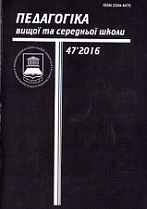Hedonistic-axiological component of vocal education for adolescents
DOI:
https://doi.org/10.31812/educdim.v47i0.2456Keywords:
vocal training, hedonistic experiences, satisfaction, artistic ideal, pleasure, teenagersAbstract
Lin Xiao. Hedonistic-axiological component of vocal education for adolescents.
The purpose of the article is to determine hedonistic-axiological reference points of vocal training for adolescents. Appeal to this problem is motivated by the strengthening of the role and functions of the axiological component of the pedagogy of art, the overcoming of reproductive teaching styles vocal. It is noted that developing the possibilities of artistic activity can be implemented only under the condition of stimulating pupils‘ hedonistic attitude to art. Considers the theoretical foundations of the hedonic imperative of identity from a philosophical, social and psychological point of view. It was found that the essence of the person who strives for hedonic experiences has transformed during the entire time of its existence. Changing the hedonic value of emotions, their place in the system of values and society, practice meet. Define the concept of «ideal art», which includes the unity of the emotional – feeling desirable and undesirable, intellectual – the concept of perfect and imperfect, strong-willed – an alternative to the present and mainstream in society. It is noted melodiousness of the Chinese and Ukrainian peoples, their ability to deeply feel the music, especially vocal. Identified the need to identify ideals in music.
Downloads
Metrics
References
2. Барт Р. Удовольствие от текста / Р. Барт ; [пер. с фр.] // Избранные работы: Семиотика. Поэтика. – Москва : Прогресс, Универс,1999. – С. 462–518.
3. Бородай Ю. М. Эротика. Смерть. Табу / Ю. М. Бородай. – Москва : Гнозис, 1996. – 416 с.
4. Василенко Л. М. Теорія та методика вокальної підготовки майбутніх учителів музичного мистецтва на гедоністичних засадах : дис. на здобуття наук. ступеня доктора пед. наук : 13.00.02 / Л. М. Василенко. – Київ, 2014. – 455 с.
5. Гонтаренко Н. Б. Сольное пение: секреты вокального мастерства / Н. Б. Гонтаренко. – Ростов н/Д : Феникс, 2007. – 155 с. 6. Дудка-Побережна Я. І. Унікальність співочого таланту видатного оперного майстра сцени ХХ століття Бориса Гмирі / Я. І. Дудка-Побережна // Педагогічна майстерність як система професійно- мистецьких компетентностей. – Вип 3. – Чернівці, 2011. – С.605–608.
7. Ламетри Ж. О. Сочинения / Ж. О. Ламетри ; [пер. с фр.]. – Москва : Мысль, 1983. – 509 с.
8. Марков Б. В. Философская антропология / Б. В. Марков. – СПб. : Лань, 1997. – 384 с.
9. Ортега-и-Гассет Х. Что такое философия? / Х. Ортега-и-Гассет // Ортега-и-Гассет Х. Что такое философия? – Москва : Наука, 1991. – С. 3–191.
10. Падалка Г. М. Педагогіка мистецтва (теорія і методика викладання мистецьких дисциплін) : [монографія] / Г. М. Падалка. – Київ : Освіта України, 2008. – 274 с.
11. Пеньковский А. Б. Радость и удовольствие в представлении русского языка / А. Б. Пеньковский // Логический анализ языка. Культурные концепты. – Москва : Наука, 1991. – С. 1–55.
12. Сі Даофен. Значення народно-пісенної творчості у виконавському мистецтві Китаю / Сі Даофен // Вісник ЛНУ імені Тараса Шевченка, 2013. – No 10 (269). – Ч. І, – С. 111–115.
13. Цзо Чжэнь-гуань. О музыкально-теоретической системе «люй» в китайской музыке / Цзо Чжэнь-гуань // Музыка народов Азии и Африки. – Вып. 4. – Москва : Сов. композитор, 1987. – С. 257–272
14. Философский энциклопедический словарь ; [гл. редакция: Л. Ф. Ильичев, П. Н. Федосеев, С. М. Ковалев, В. Г. Панов]. – Москва : Советская энциклопедия, 1983. – 840 с.
15. Фромм Э. Психоанализ и этика / Э. Фромм ; [пер. с нем.]. – Москва : ООО «Из-ва АСТ ЛТД», 1998. – 568 с.
Downloads
Published
How to Cite
Issue
Section
License
Copyright (c) 2016 Лін Сяо

This work is licensed under a Creative Commons Attribution 4.0 International License.









